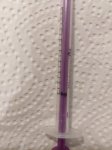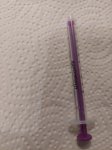Jo_
Member Since 2024
(Creating a new post since the topic is not related to the previous conversation)
When Dexter had is DKA eppisode and was in the hospital, they mentioned that he would need dental cleaning. We are hoping that it helps lowering his numbers.
Because he gets a bit feisty in the vet and has had issues with being under in the past, we had to wait to schedule it since they wanted to do it not only with the dental specialist but also the anesthesiologist.
It happened on the 13th, so 10 days ago.
He unfortunately had to remove 3 teeth. We were kind of expecting some tooth extraction, since he already had a broken canine when we rescued him (we've asked multiple times in the vet if it required treatment, but the vets never suggested it).
He was sent home with antibiotics (for 6 days) and Metacam (the painkiller, for 5 days). He seemed to be in some pain when we got him off of the Metacam, so on the 8th day we gave 2/3 do a dose and on the 9th day we gave 1/2 dose.
He's kept his appetite and energy the whole recovery and the gums and stitches seem good (no swelling, no bruising).
I just wanted to ask someone has gone through the teeth extraction process, how long until you actually saw the numbers go down and if we should start considering a dose increase.
When Dexter had is DKA eppisode and was in the hospital, they mentioned that he would need dental cleaning. We are hoping that it helps lowering his numbers.
Because he gets a bit feisty in the vet and has had issues with being under in the past, we had to wait to schedule it since they wanted to do it not only with the dental specialist but also the anesthesiologist.
It happened on the 13th, so 10 days ago.
He unfortunately had to remove 3 teeth. We were kind of expecting some tooth extraction, since he already had a broken canine when we rescued him (we've asked multiple times in the vet if it required treatment, but the vets never suggested it).
He was sent home with antibiotics (for 6 days) and Metacam (the painkiller, for 5 days). He seemed to be in some pain when we got him off of the Metacam, so on the 8th day we gave 2/3 do a dose and on the 9th day we gave 1/2 dose.
He's kept his appetite and energy the whole recovery and the gums and stitches seem good (no swelling, no bruising).
I just wanted to ask someone has gone through the teeth extraction process, how long until you actually saw the numbers go down and if we should start considering a dose increase.

 my heart just sunk a little...
my heart just sunk a little...


